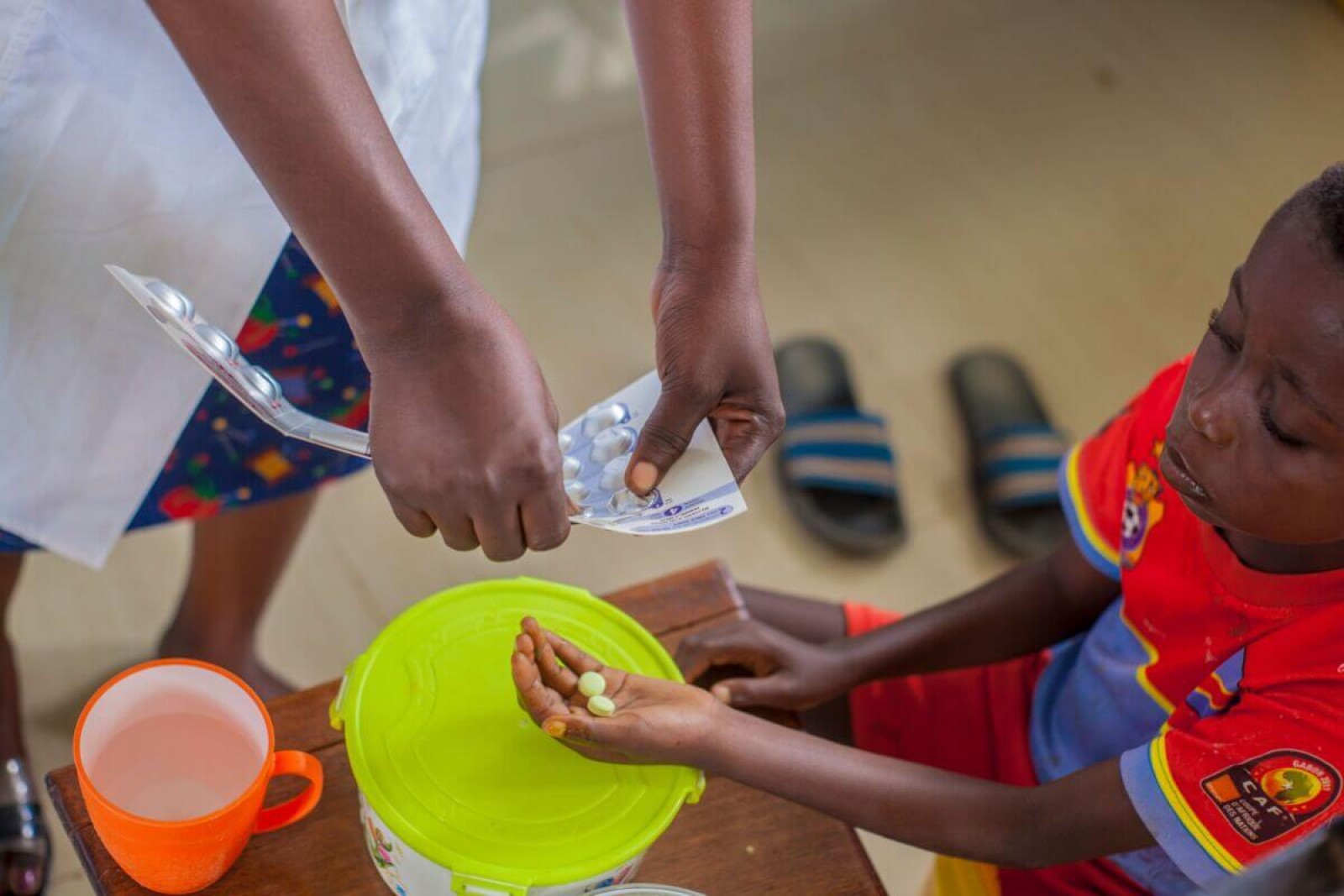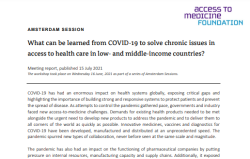7 lessons from COVID-19 for pharma companies
Direct links
COVID-19 exposed gaps in health systems and supply. The recovery risks millions being left behind.
Experts from 21 pharma companies joined the roundtable to share lessons from the pandemic.
The discussions are captured in a new meeting report, available online.

Roundtable to capture lessons from the global crisis
The COVID-19 pandemic disrupted the delivery of medicines and other health products worldwide – particularly in low- and middle-income countries – and exposed critical gaps in health systems. As attempts to control the pandemic gathered pace, governments and industry faced new access-to-medicine challenges, not least how to continue delivering healthcare while developing new products for COVID-19 patients and getting them to all corners of the world at unprecedented speed. Further action is required to curb this pandemic and prepare for the future by building strong and responsive health systems.
More than a year into the pandemic, the Access to Medicine Foundation convened a roundtable of specialists from pharmaceutical companies. They were spurred to share the practical solutions that their companies had deployed to remove barriers to healthcare and resolve unanticipated issues, as well as innovative approaches to ensure a continuous, reliable supply of essential health products. Experts from 21 pharma companies took part, including from the innovative and the generic industry, as well as from the investment community.
Chronic access issues, met by innovative solutions
The roundtable was held under the Chatham House Rule, and moderated by Jayasree K. Iyer, Executive Director of the Access to Medicine Foundation.
"Pharmaceutical companies are not siloed entities with individual supply chains and networks. Having strong relationships of trust clearly boosted the speed and agility of the industry's response in delivering medicines and vaccines. We need a better system of crisis preparation and response, which means preserving what is currently in place and working together more closely." – Jayasree K. Iyer
Strong partnerships, forged before the crisis hit, were seen as key to successfully navigating a crisis. Existing collaborations meant that partners already trusted in each other’s capacities and expert knowledge. This helped accelerate tech transfers, for example, which in turn helped production to ramp up. Formalised multi-party collaborations, for example, the Access to COVID-19 Tools Accelerator, were also noted for accelerating the industry’s response, in particular, R&D for COVID-19 products.
Supply chain challenges required continuous agility and innovation, with several companies deploying teams that specialise in identifying and resolving issues. There is clear appetite for transferring the successful collaboration approaches seen in R&D to other areas, such as to streamline the delivery of products from multiple companies to NGOs working in a specific country.
Preparing the health ecosystem for a future pandemic is critical, which means being able to quickly increase manufacturing capacity. This starts with strategic thinking early in the R&D process, about how to meet demand. For some companies, manufacturing capacity has more than doubled since the pandemic began. Stockpiling planning, where applicable, to prepare for surges in demand of other vaccines in the event of a pandemic could be a viable option.
7 key lessons from the pandemic
Through the roundtable discussions, the Foundation identified seven key lessons for building resilience into supply chains, quickly ramping up manufacturing, and making the most of each stakeholder's capacities and expertise:
Recognise own limitations, complement strengths through partnerships and downstream collaborations. Once this is clear, companies can activate and build effective partnerships to ensure supply can meet demand on a global scale.
Identify and resolve supply chain challenges, building on pilots and developing new ideas to help better prepare for the next pandemic, to ensure continuity of care and to build local capacity to address ongoing access challenges.
Embrace innovations in information-sharing, to improve supply chain alignment to reach more people. Specifically, information sharing is important for stock management and appropriate planning, for example, where cold-storage of vaccines is concerned and when securing supply routes despite national or regional boarder closures.
Ensure new products quickly reach people in LMICs by involving generic medicine manufacturers early in the development process. Fostering stronger manufacturing alliances through cooperation between large R&D based companies and generic medicine manufacturers can help expedite delivery of new and existing products and meet global demands.
Invest in a larger network of partners that can quickly ramp up local manufacturing capacity. Longer-term contingency planning and strategic coordination is needed to maximise the resilience of manufacturing networks. Companies must have a broad community of partners to rely on.
Build inventory reserves, supported by large networks of API suppliers. Companies can develop plans for stockpiling and expand communication channels with a large network of API suppliers.
Plan for the unexpected, including protectionism. When countries address their own interests first, global supply chains may be impacted, including bans or severe limits on the export of raw materials, manufacturing supplies, PPE, human resources and medical products.
Next steps
The Access to Medicine Foundation will build on these highly relevant conversations to unpack the best next steps and consider recommendations for future action. The insights from these discussions will inform the Foundation’s research and analyses moving forward, as well as its engagement work to bring lessons learnt from this pandemic into ongoing discussions on pandemic preparedness with companies, investors, governments and global health stakeholders working closely with the industry to build on what worked and to improve on what did not, moving forward.
The Access to Medicine Foundation is grateful for special funding from AXA Investment Managers and Wellcome Trust to specifically support the roundtable, as well as to the Dutch and UK governments and the Bill and Melinda Gates Foundation for their core funding.

Marijn Verhoef
Director of Private Sector Engagement
mverhoef@accesstomedicinefoundation.org
Get in touch